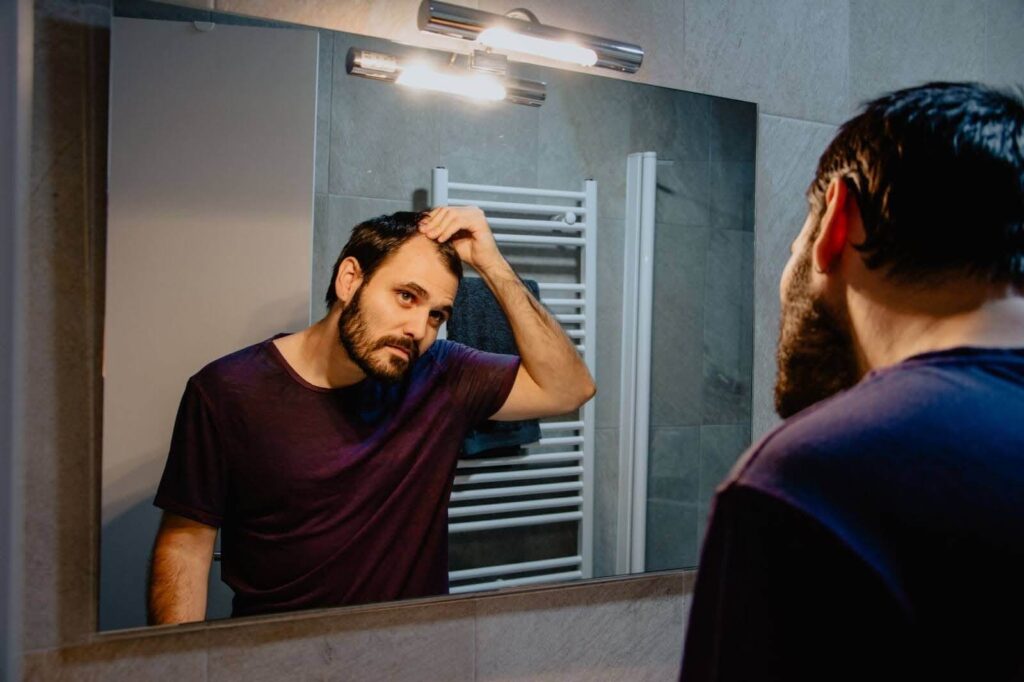As cosmetic surgery goes, hair transplants – and beard transplants – are known to be fairly easy procedures. No general anesthesia, no surgical instruments, no scars. They are also very easy to recover from. Follicular Unit Extraction in particular is so well-liked because of how easy it is to recover from, with very little downtime. Nevertheless, there are a few things you should know about hair transplant recovery.
How to Recover from a Hair Transplant
Exercise and Strenuous Activity
Your surgeon will likely advise you to refrain from physical activities for a time after your hair transplant. At Nashville Hair Doctor, we recommend two weeks of avoiding certain activities that do not help healing. For instance, we recommend that you only bend down using your knees, not your waist. We don’t want you to do anything for an extended period where the blood can rush to your head. Sorry, the monkey bars are off limits for a couple of weeks! (also, no scuba diving for the same reason.) We also prefer you stay away from any exercise that will lead to heavy sweating. If you have certain exercises as a part of your daily routine, it’s best to ask your provider about these exercises specifically.
Washing Your Hair
Many patients worry about washing their hair. When can you safely wash your hair without putting the newly implanted grafts at risk? The answer is, it’ not as risky as you think. You can safely wash your hair after 48 hours, but if you want to give it an extra day, of course that’s fine too. We recommend not applying shampoo directly on your head, but rather putting a small drop in a cup. Then you fill the cup with water to make a bubbly mix to pour over your head, then rinse with more water from the cup. This ensures that you are treating your hair grafts in the gentlest way, yet don’t have to face the world with greasy hair! Don’t let the spray from the shower head come in direct contact with your head for the first week. After that, you can treat your hair as you normally would.
Wearing a Hat
We understand that it’s tempting to cover your newly transplanted scalp with a hat before you go out into the world. But we recommend you wait before doing this at least 3 days. You can wear a loose-fitting hat after 3 days, and a more tightly fitting hat, like a baseball cap, after 5. Basically, after 5 days you are totally fine to wear whatever you want on your head. Just to give you an idea, we would have to surgically remove the grafts from your head after 5 days to have any chance of pulling them out. Basically, there is nothing you can do after more than 5 days post-op that would cause your grafts to fall out. (Please know that some of your hair does actually fall out, anywhere from a few weeks to a few months after your transplant; this is a completely normal part of the hair growth cycle. It doesn’t mean you’ve lost your new grafts. They have just shed their hairs, which happens to your healthy hair all the time).
Itching, Swelling, Sun and Ice
It is normal for your head to have some swelling after the procedure, typically around day 3 and 4. To prevent swelling, we recommend keeping your head elevated for the first 7 days (i.e. sleeping in a recliner instead of your bed – think Netflix binge-watching while there). This is just a precaution, as you may never experience any swelling at all. You may also apply ice just above the eyebrows, but not onto the transplanted area itself. If your scalp feels itchy, refrain from scratching it the first few days. You want to make sure the scabs can form undisturbed. Rubbing in a little conditioner can help against itchiness. Try not to expose your scalp to direct sunlight for 2 weeks. As mentioned before, you’re allowed to put on a hat after 3-5 days, depending how snug it is. Vacationing during your hair transplant recovery is a great idea – just make sure you stay out of the sun.
Alcohol, Hair Dye, and Smoking
While it’s fine to dye your hair right before a transplant, you should refrain from it for 4 weeks afterwards. The harsh chemicals can have a negative impact on the still frail hair graft as they’re taking root. It’s not likely that you would anyway, considering that your area of transplantation will have been shaved to prep for the transplant. For the same amount of time – 4 weeks – you should also refrain from smoking. We’d encourage you to give it up altogether, but if you can’t, make sure you don’t negatively impact your blood flow and hair growth by smoking too early. It’s a little easier with alcohol – we recommend you wait 5 days before consuming it, as it can also interfere with the blood supply to your head.
We hope that the above tips will help you with your hair transplant recovery. At Nashville Hair Doctor, it’s very important for us that you make the best choice and are happy with your decision. Having a hair transplant is a big step, and we want to make sure that you have all the facts before you start so that you have a successful recovery.
When you go home after your hair transplant surgery, you’ll likely be given a list of instructions. Make sure you read this carefully, and check back with your provider if you have any questions. You can always call Nasvhille Hair Doctor and we will take time to give you all the answers you are looking for. If you are just in the beginning stages of exploring a hair transplant, use our Online Quote form to upload your photos and get a FREE and no-obligation quote within a business day.

